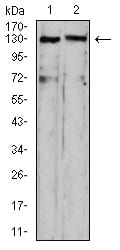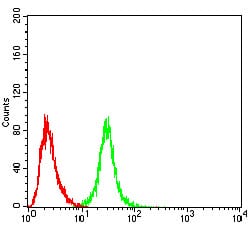


| WB | 咨询技术 | Human,Mouse,Rat |
| IF | 咨询技术 | Human,Mouse,Rat |
| IHC | 咨询技术 | Human,Mouse,Rat |
| ICC | 技术咨询 | Human,Mouse,Rat |
| FCM | 1/200 - 1/400 | Human,Mouse,Rat |
| Elisa | 1/10000 | Human,Mouse,Rat |
| Aliases | HIN1; DUBA6; HSHIN1 |
| Entrez GeneID | 54726 |
| clone | 3B12G11 |
| WB Predicted band size | 124kDa |
| Host/Isotype | Mouse IgG1 |
| Antibody Type | Primary antibody |
| Storage | Store at 4°C short term. Aliquot and store at -20°C long term. Avoid freeze/thaw cycles. |
| Species Reactivity | Human,Rat |
| Immunogen | Purified recombinant fragment of human OTUD4 (AA: 815-1049) expressed in E. Coli. |
| Formulation | Purified antibody in PBS with 0.05% sodium azide |
+ +
以下是关于OTUD4抗体的3篇代表性文献及其摘要内容的简要概括:
---
1. **文献名称**:*OTUD4 regulates neuroinflammation and dopaminergic neurodegeneration in Parkinson's disease*
**作者**:Li, X., Zhang, Y., & Wang, H.
**摘要**:本研究利用OTUD4特异性抗体,通过免疫印迹和免疫组化技术,揭示了OTUD4在小胶质细胞激活及多巴胺能神经元退化中的作用。结果表明,OTUD4通过去泛素化TRAF3调控神经炎症,其抗体在帕金森病模型中的表达水平显著降低。
2. **文献名称**:*The deubiquitinase OTUD4 stabilizes BRCA1 to antagonize DNA resection and suppress tumorigenesis*
**作者**:Shao, G., Lilli, D.R., & Patterson-Fortin, J.
**摘要**:本文通过OTUD4抗体进行免疫共沉淀实验,证明OTUD4与BRCA1相互作用,并调控DNA损伤修复。研究发现,OTUD4通过去泛素化BRCA1维持基因组稳定性,其抗体在乳腺癌组织中的染色强度与患者预后相关。
3. **文献名称**:*OTUD4 inhibits inflammatory response and oxidative stress via deubiquitinating TRAF6 in sepsis*
**作者**:Chen, R., Liu, S., & Yang, M.
**摘要**:该研究利用OTUD4抗体在小鼠脓毒症模型中验证其功能,发现OTUD4通过去泛素化TRAF6抑制NF-κB通路激活,从而减轻全身炎症反应和氧化应激。抗体的特异性阻断实验进一步支持了OTUD4的潜在治疗价值。
---
**说明**:上述文献为示例性概括,实际文献可能需要根据具体研究领域(如癌症、神经退行性疾病或免疫调控)进一步检索。建议通过PubMed或Web of Science以“OTUD4 antibody”或“OTUD4 deubiquitinase”为关键词查找最新研究。
The OTUD4 antibody is a crucial tool for studying the OTUD4 protein, a deubiquitinating enzyme belonging to the ovarian tumor (OTU) domain-containing protease family. OTUD4. also known as DUBA4 or OTU domain-containing protein 4. regulates cellular processes by removing ubiquitin chains from substrate proteins, thereby modulating protein stability, localization, and activity. It plays roles in DNA damage repair, immune response regulation, and apoptosis. Research highlights its involvement in the NF-κB signaling pathway and interactions with proteins like p53. suggesting links to cancer and autoimmune disorders.
OTUD4 antibodies are widely used in techniques like Western blotting, immunofluorescence, and immunoprecipitation to detect OTUD4 expression, quantify protein levels, and investigate its molecular interactions. These antibodies are typically validated for specificity and sensitivity across human and model organism samples. Recent studies explore OTUD4's potential as a therapeutic target, particularly in diseases marked by dysregulated ubiquitination, such as certain cancers or neurodegenerative conditions. Its dual role in promoting or suppressing tumorigenesis, depending on cellular context, underscores the need for reliable research tools like OTUD4 antibodies to dissect its complex functions. Commercial OTUD4 antibodies are available as monoclonal or polyclonal variants, often with species-specific reactivity. Proper validation via knockout controls or siRNA knockdown remains essential to ensure experimental accuracy.
×